大学英语精读book1 unit4答案
袁祥恒整理 大学思辨英语精读1 Unit 4答案
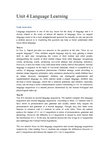
Unit4Language LearningUnit overviewLanguage acquisition is one of the key issues for the study of language and it is closely related to the study of almost all aspects of language.How we acquire language seems to be a most straightforward question but actually no one can provide a definite answer to it.Exploring this question can help us better understand other issues about language.Text AIn Text A,Napoli provides two answers to the question in the title,“How do we acquire language?”.First,children acquire language step by step,gaining a certain skill in each step:recognizing the voices of their mother and other people, distinguishing the sounds of their mother tongue from other language,recognizing words,producing words,producing two-word phrases and producing sentences. However,it does not mean every individual child exactly follows this pattern.Second, language is acquired on the basis of Universal Grammar,which is exemplified by a variety of language acquisition phenomena:Children arrange words according to abstract innate linguistic principles;early utterances produced by small children have an innate structure;immigrants’children can distinguish grammatical and ungrammatical language us;while parents speak a pidgin language,children may develop a creole language,which has a coherent grammar;and children,especially twins,can develop a secret communication system conforming to UG.In conclusion, language acquisition is a natural process determined by the human biological and physiological make-up.Text BText B is focused on second language acquisition.The authors compare first language acquisition and second language acquisition.According to them,L2learners tend to have errors in pronunciation and grammar and usually cannot fully acquire the pronunciation and grammar of a second language.Though,they also share some features in common with L1learners in terms of work order.Then,the authors analyze the impact of L1on L2acquisition in terms of pronunciation,grammar and phonology.However,the difficulty in L2acquisition is caused by more factors than the interference of L1.In the end,the authors discuss the role of age in L2acquisition and challenges the Critical Period Hypothesis.The two articles focus on first language acquisition and second language acquisition respectively.After reading Text A,students can compare the differences between L1 and L2acquisition and discuss the impact of L1on L2acquisition.Teaching objectivesReading skills●Summarize the main idea of each paragraph●Identify topic sentences and key words●Identify supporting detailsCommunicative competence●Illustrate your points with appropriate examples●Use topic sentences and supporting sentences to organize your presentation/essay ●Use euphemisms for possibly impolite expressionsCritical thinking●Use different examples to support different aspects of an idea●Use observation and literature to collect first-hand and second-hand evidence●Critique a“popular”folk theory with exemplification and reasoning Intercultural competence●Be aware of the differences and similarities between English and Chineseeuphemisms●Compare the Chinese language and the English language in terms of L1and L2learning●Understand the effects of cultural differences on communication and languagelearningTeaching strategiesYou can arouse the students’interest in this topic by showing them the Nature vs. Nurture debate,which is controversial in not only language acquisition but also psychology,education,law and popular culture.There is no definite answer to this debate but every student may have his or her own answer.After learning this unit, they will get new evidence or examples to support their answer or they may simply change their view.For a detailed description of child language acquisition,you can refer to Chapter8in Towards an Understanding of Language and Linguistics(《语言学概论》)by Lan Chun.Other resources include:●A general introduction/language.html●Emphasis on nature vs.emphasis on experience/news/special_reports/linguistics/learn.jsp●Language acquisition nguage learning/inservices/language_acquisiti_vs_language_02033.phpPreparatory work(1)Language Matters:A Guide to Everyday Questions About LanguageThis activity aims to arouse students’interest in other everyday questions about language which they often take for granted.They can also learn to search for an academic monograph on the Internet.The twelve questions answered by the author in the book are:●Question1:How do we acquire language?●Question2:From one language to the next:Why is it hard to learn a secondlanguage?Why is translation so difficult?●Question3:Does language equal thought?●Question4:Are sign languages real languages?●Question5:Do animals have language?●Question6:Can computers learn language?●Question7:Whose speech is better?●Question8:Why do dialects and creoles differ from standard language?●Question9:Do men and women speak differently?And who cares?●Question10:English spelling is hard,and it makes learning to read hard.Shouldwe do anything about it?●Question11:Should the United States adopt English as our official language andoverhaul our educational system accordingly?●Question12:Does exposure to and use of offensive language harm children?The book can be found on ,which also provides the second edition of the book with15questions about language.(2)Small children learning languageThis activity provides an opportunity for students to reflect on their personal experiences of learning language and collect some real examples of language learning, which can be analyzed during the reading of Text A.Relevant cases can also be found on the Internet,for example:/s?__biz=MzA5MzUxNTQ3Nw==&mid=206097261&id x=1&sn=ff8cb7a4119c131e3773e9f7d58d2fa6#rd(3)Universal GrammarThis activity is of great importance for understanding the second part of Text A. Definition:Universal Grammar proposes that the ability to learn grammar andlanguage is hard-wired into the brain.It is shared by all human languages.Chomsky argued that the human brain contains a limited set of rules for organizing language. Key publications of Chomsky:●Syntactic Structures,London:Mouton,1957.●Current Issues in Linguistic Theory,The Hague:Mouton,1964.●Aspects of the Theory of Syntax,Cambridge:M.I.T.Press,1965.●Language and Mind,New York:Harcourt,Brace&World,1968.●Studies on Semantics in Generative Grammar,The Hague:Mouton,1972.●The Logical Structure of Linguistic Theory,New York:Plenum Press,1975.●Lectures on Government and Binding:The Pisa Lectures,Dordrecht,Holland:Foris Publications,1982.●Some Concepts and Consequences of the Theory of Government and Binding,Cambridge:M.I.T.Press,1982.●Language and Thought,Wakefield,RI:Moyer Bell,1993.●The Generative Enterprise Revisited:Discussions with Riny Huybregts,Henkvan Riemsdijk,Naoki Fukui,and Mihoko Zushi,with a new foreword by Noam Chomsky,Berlin:Mouton de Gruyter,2004.For more information about Chomsky,please refer to the following website: /index.htm(4)Types of languageThis activity provides background information necessary for understanding different kinds of language mentioned by Napoli in Text A.Motherese/baby talk(Paragraph7):It is a nonstandard form of speech used by adults in talking to toddlers and infants.It features high pitch and special vocabulary,e.g. doggy for dog(Para.10),daddy for dad(Para.10),kitty for cat and wawa for water.A feature of baby talk in Chinese is reduplication,e.g.喝水水and吃饭饭。
大学英语精读董亚芬Book1-Unit4课后练习完整答案

Ⅲ. Vocabulary Activities 4.
1) Ted is expected to _____________________________ come up with some good solution after he has considered the problem. (come up with) 2) I hear young people under 18 _________________ are prohibited from buying cigarettes in that country (prohibit) 3) Taking responsibility for yourself is part of the process of __________. growing up (grow) 4) Efforts to _____________________ bring together people of different races and cultures have not met with complete success. (bring together) 5) The United States experience a sharp rise in its birth rate after the Second World War, known ______________ as the “baby boom”. (rate) in part to the drought. (part) 6) The crop failure was due _______
shows
10) we had a ball
j. produce
Ⅲ. Vocabulary Activities 2.
大学英语精读4课后习题答案
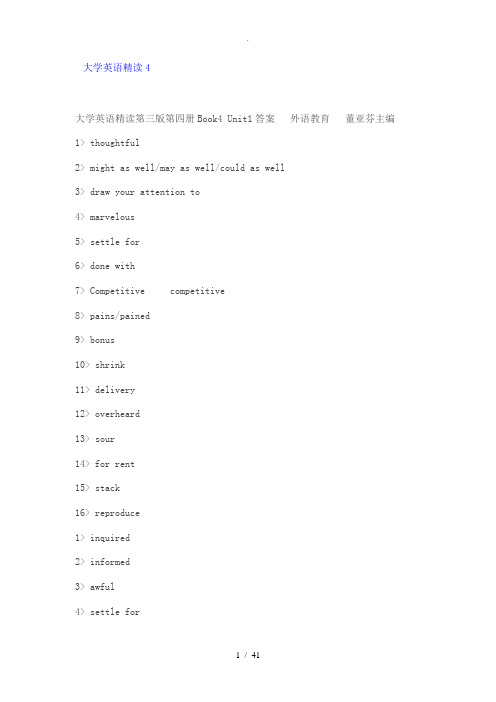
大学英语精读4大学英语精读第三版第四册Book4 Unit1答案外语教育董亚芬主编1> thoughtful2> might as well/may as well/could as well3> draw your attention to4> marvelous5> settle for6> done with7> Competitive competitive8> pains/pained9> bonus10> shrink11> delivery12> overheard13> sour14> for rent15> stack16> reproduce1> inquired2> informed3> awful4> settle for5> trash6> claimed7> Normally8> a piece of cake9> be done with10> enable11> am entitled12> quite a while1> ask for2> was set up/has been set up3> pulled up4> gives off5> was held up6> keep up7> ran over8> made up9> be left out10> cut off1> It pained Jenny to learn of Jim's refusal to help her with the translation.2> The extra work to be assigned to you will greatly cut into your spare time.3> We'd been at the job for hours, but we hardly made a dent in it.4> You have no business saying those nasty things about Dick.5> We might as well listen to the radio program since there isn't anything interesting on television.1> standee2> payee3> grantee4> addressee5> a person who is absent6> a person who is being trained7> a divorced person8> a person who is appointed1> output2> breakdown3> setup4> Takeoff5> drawbacks6> breakthrough7> cutback8> takeover1> paper, store, shop, case, cream2> making, keeping, bathing, conditioning, walking3> market, way, stop, board/smith, ground4> pill, water, material, point, machine5> pour, look/put/come, come,6> out, back/up, through/down/out1> a dozen years2> dozens of times3> two dozen passengers4> dozens of phone calls5> three dozen boxes6> a dozen bottles/a dozen bottles of wine1> a great deal of pain "has been caused by evils which have never happened"2> the elderly lady Miss Morris quarrelled with was none other than her future mother-in-law3> this essay is well-written except for a few grammatical mistakes4> I just caught the train in time5> You can't eat your cake and have it too1> You ought to know better than to go swimming straight after a meal.2> Uncle Rob should have known better than to trust that treacherous son of his.3> Sally is old enough to know better than to spend all her money on fancy goods.4> Miss Miller certainly knows better than to explore the desert all alone.5> His college sons should have known better than to try to get the best out of their employees by threatening them with bodily harm.6> You ought to know better than to go out in this freezing weather in those thin clothes. You'll get frozen.1> delivery2> a piece of cake3> inquire4> pulling up.5> stacks6> deadline7> marvelous8> enable9> cut into10> settle for11> settled our accounts12> minimum13> known better than1> advertisement/ad2> read3> No4> like5> words6> towards7> which8> sizes9> sitting10> water11> bottle12> one13> started14> passed15> run/pass.16> into17> coming18> if19> quit20> hour21> wrote翻译1> 我们接到通知,财政部长将于次日接见我们。
大学英语精读第三版(董亚芬主编)第二册 Unit1~Unit10 翻译答案
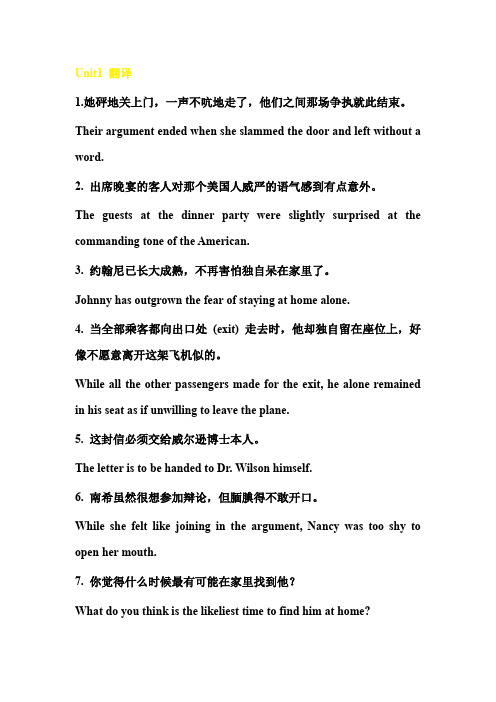
Unit1 翻译1.她砰地关上门,一声不吭地走了,他们之间那场争执就此结束。
Their argument ended when she slammed the door and left without a word.2. 出席晚宴的客人对那个美国人威严的语气感到有点意外。
The guests at the dinner party were slightly surprised at the commanding tone of the American.3. 约翰尼已长大成熟,不再害怕独自呆在家里了。
Johnny has outgrown the fear of staying at home alone.4. 当全部乘客都向出口处(exit) 走去时,他却独自留在座位上,好像不愿意离开这架飞机似的。
While all the other passengers made for the exit, he alone remained in his seat as if unwilling to leave the plane.5. 这封信必须交给威尔逊博士本人。
The letter is to be handed to Dr. Wilson himself.6. 南希虽然很想参加辩论,但腼腆得不敢开口。
While she felt like joining in the argument, Nancy was too shy to open her mouth.7. 你觉得什么时候最有可能在家里找到他?What do you think is the likeliest time to find him at home?8. 猎人一看见有只狐狸从树丛中出现并向他设下(lay) 的陷阱(trap) 方向跑去,脸上顿时闪出了兴奋的表情。
The hunter’s face lit up with excitement as soon as he saw a fox emerge from among the bushes and run in the direction of / make for the trap he had laid.Unit2 翻译1) 会上有人建议任命一个十一人委员会来制定新章程。
大学英语精读一课后答案(完整版)
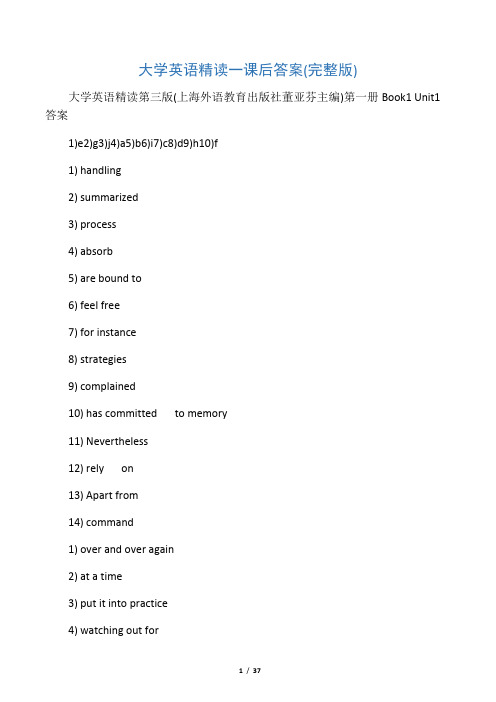
大学英语精读一课后答案(完整版)大学英语精读第三版(上海外语教育出版社董亚芬主编)第一册Book1 Unit1答案1)e2)g3)j4)a5)b6)i7)c8)d9)h10)f1) handling2) summarized3) process4) absorb5) are bound to6) feel free7) for instance8) strategies9) complained10) has committed to memory11) Nevertheless12) rely on13) Apart from14) command1) over and over again2) at a time3) put it into practice4) watching out for5) by no means6) concentrate on7) In addition t8) in detail1)action2)employ3)announce4)examination5)communication6)express7)compose8)improvement9)concentration10)management11)consider12)motivate13)development14)movement15)discuss16)operate17)division18)production19)educate20)repeat1) additional2) add3) addition4) addition1) effectively2) effect3) effective4) effect1) helpful2) help3) helpless4) help5) helplessly6) helpfully7) helpful1) reliant2) reliable3) reliance reliable4) relies5) reliably6)1) repetition2) repeating3) repeatedly4) repeated5) repetition1) In my opinion2) According to Mary3) In our opinion4) According to today's papers5) In most doctors' opinion According to most doctors1) Shakespeare was not only a dramatist but also an actor.2) Miss Crain not only took me home in her car, but also camethe next day to see if I hadrecovered.3)Hainan Island attracts tourists not only in winter but also in summer.4)There is always a black market not only in Britain,but also in other European countries.5)At the Athens Olympics in 2004,Liu Xiang not only won a gold medal in the 110-meter hurdles,but also broke the Olympic record.1)It is true that your sentences are all grammatically correct,but they don’t make any sense.2) It is true that they lost that battle, but they still wenton fighting.3) It is true that Tom’s very clever and hardworking, but Istill don’t think he is the right person forthe job.4) It is true that learning English is by no means easy, butwe can make the task easier by usingsome learning strategies.1) strategies2) frequently3) over and over again4) commit to memory5) acquaintance6) watch out for7) communicate8) process9) opportunities10) rely on11) put into practice12) absorbed1) if2) about3) it4) know5) up6) as7) addition8) even9) into10) other11) for12) while1) memorize2) a matter of3) taught4) shelf5) realize6) written7) idiomatic8) join in9) difference10) gain a good command 翻译1)史密斯太太对我抱怨说,她经常发现与自己十六岁的女儿简直无法沟通。
大学英语精读一课后答案(完整版)

大学英语精读一课后答案(完整版)大学英语精读第三版(上海外语教育出版社董亚芬主编)第一册Book1 Unit1答案1)e2)g3)j4)a5)b6)i7)c8)d9)h10)f1) handling2) summarized3) process4) absorb5) are bound to6) feel free7) for instance8) strategies9) complained10) has committed to memory11) Nevertheless12) rely on13) Apart from14) command1) over and over again2) at a time3) put it into practice4) watching out for5) by no means6) concentrate on7) In addition t8) in detail1)action2)employ3)announce4)examination5)communication6)express7)compose8)improvement9)concentration10)management11)consider12)motivate13)development14)movement15)discuss16)operate17)division18)production19)educate20)repeat1) additional2) add3) addition4) addition1) effectively2) effect3) effective4) effect1) helpful2) help3) helpless4) help5) helplessly6) helpfully7) helpful1) reliant2) reliable3) reliance reliable4) relies5) reliably6)1) repetition2) repeating3) repeatedly4) repeated5) repetition1) In my opinion2) According to Mary3) In our opinion4) According to today's papers5) In most doctors' opinion According to most doctors1) Shakespeare was not only a dramatist but also an actor.2) Miss Crain not only took me home in her car, but also camethe next day to see if I hadrecovered.3)Hainan Island attracts tourists not only in winter but also in summer.4)There is always a black market not only in Britain,but also in other European countries.5)At the Athens Olympics in 2004,Liu Xiang not only won a gold medal in the 110-meter hurdles,but also broke the Olympic record.1)It is true that your sentences are all grammatically correct,but they don’t make any sense.2) It is true that they lost that battle, but they still wenton fighting.3) It is true that Tom’s very clever and hardworking, but Istill don’t think he is the right person forthe job.4) It is true that learning English is by no means easy, butwe can make the task easier by usingsome learning strategies.1) strategies2) frequently3) over and over again4) commit to memory5) acquaintance6) watch out for7) communicate8) process9) opportunities10) rely on11) put into practice12) absorbed1) if2) about3) it4) know5) up6) as7) addition8) even9) into10) other11) for12) while1) memorize2) a matter of3) taught4) shelf5) realize6) written7) idiomatic8) join in9) difference10) gain a good command 翻译1)史密斯太太对我抱怨说,她经常发现与自己十六岁的女儿简直无法沟通。
新编大学英语4课后练习答案(Unit 1, Book 4)
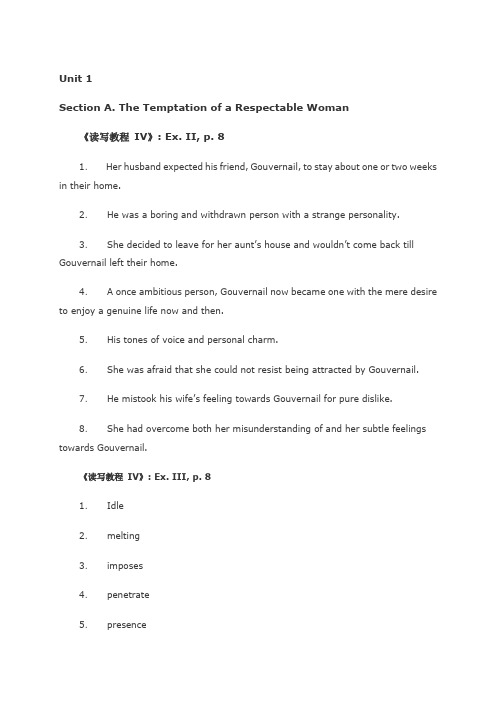
Unit 1Section A. The Temptation of a Respectable Woman《读写教程IV》:Ex. II, p. 81.Her husband expected his friend, Gouvernail, to stay about one or two weeks in their home.2.He was a boring and withdrawn person with a strange personality.3.Sh e decided to leave for her aunt’s house and wouldn’t come back till Gouvernail left their home.4. A once ambitious person, Gouvernail now became one with the mere desire to enjoy a genuine life now and then.5.His tones of voice and personal charm.6.She was afraid that she could not resist being attracted by Gouvernail.7.He mistook his wife’s feeling towards Gouvernail for pure dislike.8.She had overcome both her misunderstanding of and her subtle feelings towards Gouvernail.《读写教程IV》: Ex. III, p. 81.Idle2.melting3.imposes4.penetrate5.presence6.nuisance7.nonsense8.keen《读写教程IV》: Ex. IV, p. 91.run down2.taken seriously3.drinking in4.in no sense5.made excellent observations on 6.counted on7.for my part8.make a fuss《读写教程IV》: Ex. V, p. 9 1.sanctions2.Restrictions3.fine4.limits5.problems6.tax7.duty8.responsibility《读写教程IV》: Ex. VI, p. 101. justify2. glorify3. exemplifies4. classified5. purified6. intensify7. identify8. terrified《读写教程IV》: Ex. VII, p. 101. bravery2. jewellery3. delivery4. machinery5. robbery6. nursery7. scenery8. discovery《读写教程IV》: Ex. VIII, p. 111. She said it might have been all right, if the weather had been good.2. Mrs. Baroda said she might have liked Gouvernail if he had been like the others.3. If I had been there, I could have helped you.4. He could have got tickets if there had been some cheap ones.5. Mrs. Baroda might have yielded to the temptation if she hadn’t been a respectable and sensible person.《读写教程IV》: Ex. IX, p. 111. “You were different then.” “So was she.”2. “You used to say he was a man of wit.”“So he is.”3. “You’ve made a mistake here.”“Oh, so I have. Thank you.”4. “Children should behave themselves.”“So should adults.”5. “This glass is cracked.”“Oh, so it is. I hadn’t noticed.”《读写教程IV》: Ex. X, p. 121. He imposed his company upon her in spite of her repeated hints of hoping to be left alone.2. His friends can never count upon how he is going to act under given conditions, as he is always full of surprises.3. Don’t make a fuss about such a small thing because that is the last thing I expected.4. Besides being an upright and respectable woman Mrs. Baroda was also a very sensible one.5. She had never known her thoughts to be so confused, unable to gather anything from them.6. From Gouvernail’s talk, Mrs. Baroda came to know that his periods of silence were not his basic nature, but the result of moods.7. To Gaston’s delight, his wife had finally overcome her dislike for Gouvernail and invited Gouvernail to visit them again wholly from herself.8. Mrs. Baroda felt confused with Gouvernail’s puzzling nature and found it hard to penetrate the silence in which he had unconsciously covered himself.《读写教程IV》: Ex. XI, p. 121. 在一起呆了几天,她仍感到对这个客人很陌生,只得大部分时间让丈夫陪着他。
大学英语精读答案1~4册全
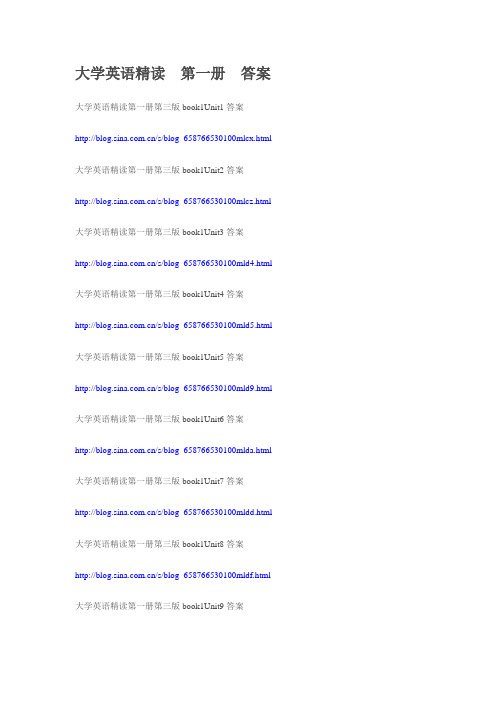
大学英语精读第一册答案大学英语精读第一册第三版book1Unit1答案/s/blog_658766530100mlcx.html 大学英语精读第一册第三版book1Unit2答案/s/blog_658766530100mlcz.html 大学英语精读第一册第三版book1Unit3答案/s/blog_658766530100mld4.html 大学英语精读第一册第三版book1Unit4答案/s/blog_658766530100mld5.html 大学英语精读第一册第三版book1Unit5答案/s/blog_658766530100mld9.html 大学英语精读第一册第三版book1Unit6答案/s/blog_658766530100mlda.html 大学英语精读第一册第三版book1Unit7答案/s/blog_658766530100mldd.html 大学英语精读第一册第三版book1Unit8答案/s/blog_658766530100mldf.html 大学英语精读第一册第三版book1Unit9答案/s/blog_658766530100mldk.html大学英语精读第一册第三版book1Unit10答案/s/blog_658766530100mldl.html大学英语精读第一册第三版课后翻译答案/s/blog_658766530100mldm.html欢迎点击/enfreshman查看更多大学英语精读答案大学英语精读第二册答案大学英语精读第二册第三版book2Unit1答案/s/blog_658766530100iulr.html大学英语精读第二册第三版book2Unit2答案/s/blog_658766530100iult.html大学英语精读第二册第三版book2Unit3答案/s/blog_658766530100izab.html大学英语精读第二册第三版book2Unit4答案/s/blog_658766530100j1dv.html大学英语精读第二册第三版book2Unit5答案/s/blog_658766530100j1dw.html/s/blog_658766530100j1dx.html大学英语精读第二册第三版book2Unit7答案/s/blog_658766530100j1e0.html大学英语精读第二册第三版book2Unit8答案/s/blog_658766530100j1e3.html大学英语精读第二册第三版book2Unit9答案/s/blog_658766530100j9eg.html大学英语精读第二册第三版book2Unit10答案/s/blog_658766530100j9ej.html大学英语精读第二册第三版课后翻译答案/s/blog_658766530100lctj.html欢迎点击/enfreshman查看更多大学英语精读答案大学英语精读第三册答案大学英语精读第三册第三版book3Unit1答案/s/blog_658766530100mldq.html大学英语精读第三册第三版book3Unit2答案/s/blog_658766530100mldt.html/s/blog_658766530100mldu.html大学英语精读第三册第三版book3Unit4答案/s/blog_658766530100mldv.html大学英语精读第三册第三版book3Unit5答案/s/blog_658766530100mldx.html大学英语精读第三册第三版book3Unit6答案/s/blog_658766530100mle1.html大学英语精读第三册第三版book3Unit7答案/s/blog_658766530100mle2.html大学英语精读第三册第三版book3Unit8答案/s/blog_658766530100mle6.html大学英语精读第三册第三版book3Unit9答案/s/blog_658766530100mle8.html大学英语精读第三册第三版book3Unit10答案/s/blog_658766530100mlea.html大学英语精读第三册第三版课后翻译答案/s/blog_658766530100mleb.html欢迎点击/enfreshman查看更多大学英语精读答案大学英语精读第四册答案大学英语精读第四册第三版book4Unit1答案/s/blog_658766530100lc8s.html 大学英语精读第四册第三版book4Unit2答案/s/blog_658766530100lc8o.html 大学英语精读第四册第三版book4Unit3答案/s/blog_658766530100lc8n.html 大学英语精读第四册第三版book4Unit4答案/s/blog_658766530100lc8m.html 大学英语精读第四册第三版book4Unit5答案/s/blog_658766530100lc8k.html 大学英语精读第四册第三版book4Unit6答案/s/blog_658766530100lbe3.html 大学英语精读第四册第三版book4Unit7答案/s/blog_658766530100lbe0.html 大学英语精读第四册第三版book4Unit8答案/s/blog_658766530100lbdz.html 大学英语精读第四册第三版book4Unit9答案/s/blog_658766530100lbay.html大学英语精读第四册第三版book4Unit10答案/s/blog_658766530100lb6f.html大学英语精读第四册第三版课后翻译答案/s/blog_658766530100lc8u.html欢迎您点击/enfreshman查看更多大学英语精读答案。
- 1、下载文档前请自行甄别文档内容的完整性,平台不提供额外的编辑、内容补充、找答案等附加服务。
- 2、"仅部分预览"的文档,不可在线预览部分如存在完整性等问题,可反馈申请退款(可完整预览的文档不适用该条件!)。
- 3、如文档侵犯您的权益,请联系客服反馈,我们会尽快为您处理(人工客服工作时间:9:00-18:30)。
大学英语精读第三版(上海外语教育出版社董亚芬主编)第一册Book1 Unit4答案1)g2)f3)h4)i5)a6)b7)c8)e9)j10d)1)free2)accept3)at least4)different5)failure6)sunset7)quiet8)in the past9)unnecessary10)turn off1)involves2)proposal3)emotional4)at first glance5)actually6)disturbed7)typical8)come up with9)worthwhile10)Imagination11)current12)neighborhood13)gap14)activities1) come up with some good2) are prohibited from3) growing up4) to bring together people5) in its birth rate6) in part1) honestly2) dishonest3) honesty4) honest5) honest1) childish2) childishly3) child4) Childhood5) Childhood1) activities2) act3) active4) act5) actively6) Actions7) activity1) emotional2) unemotional3) emotion4) Emotionally5) emotional1) acceptable acceptably2) accept3) acceptance4) accept1) distraction2) distracted3) distracts4) distracting5) distractions1) We're going into town to see a film.2) I learned the news over the radio.3) Because he's able to tell at a glance if it is genuine.4) I'm afraid he's not here at the moment – he's at work.5) Well, at a distance he does look a bit like Tom.6) There were one or two unsatisfactory moments, but on the whole it was very enjoyable.1) The Johnsons decided to take a ride to the seaside for the weekend.2) Our manager will pay a visit to France this winter.3) He had/took a rest after walking ten miles.4) I had a talk with her yesterday afternoon.5) This morning the technicians had a discussion on/about the question of improving the design of the machine.6) Nathan Hale took a last look at his beautiful country and said that he only regretted he had but one life to lose for his country.1) With your support, we might succeed in performing our task.2) Even with air and water, plants still couldn't grow on the moon.3) Without hard work / Without working hard, you will accomplish nothing.4) Without their assistance, he would have found himself in trouble.5) It has been (is) about four and a half years since the Wangs settled down in this country.6) It has been (is) less than three months since she joined the Youth League.7) It has been (is) 20 years since I got to know her in Beijing.8) It has been (is) over a century since the railway was completed.1) He proposed that we (should) put on a short play at the English evening.2) I suggest that he (should) visit the Great Wall, the Summer Palace, etc.3) He proposed that the novel (should) be made into a film.4) My proposal is that the dispute (should) be settled by peaceful means.1) proposed2) prohibited3) social4) actually5) rate6) bringing together7) proposal8) worthwhile9) involveA1)fun2)turn3)in4)different/interesting5)make6)will7)by/from9)and10)in11)watch12)or13)in14)to15)there16)for17)may18)home19)reasons B1)but2)used3)little/bit4)few5)little6)number8)while9)any10)deal11)no12)now1) gathered2) in the habit of3) on the radio4) on television5) comfortably6) trouble7) art8) more and more9) problems10) however perfectly 翻译1) 接受这份工作就得经常在周末上班,但约翰并不在意。
To take this job would involve working on weekends frequently, but John didn't mind.2) 众所周知,肺癌至少部分地是由于吸烟过多而引起的。
It is well known that lung cancer is caused at least in part by smoking too much.3) 我祖父母说,发明电视的那个人曾住在他们那个地段。
My grandparents said that the man who invented television had once lived in their neighborhood.4) 我提议咱们会后马上去办公室找史密斯教授,邀请他参加我们的英语晚会。
I propose that we go to find Prof. Smith in his office right after the meeting and invite him to our English evening.5) 她因那病开过两次刀,身体十分虚弱,几乎站不起来。
Having been operated on twice for the disease, she was so weakened that she could barely stand up.6) 教育家们认为,伴随着电视机长大的一代人,在电视机前花的时间太多,以致没有足够的时间学习了。
Educators think that the generation growing up with television spend so much of their time in front of the TV that they do not have enough time to study.7) 我真希望你能拿出一个比这更好的解决办法(solution) 来。
I do hope that you can come up with a better solution than this one.8) 乍一看,这幅画并不好,但经过仔细观察,我们才发现它的确是一幅杰作(masterpiece)。
At first glance the picture didn't look very good, but after examining it carefully, we found that it was indeed a masterpiece.附: Reading Activity及Guided Writing1) docile obedient 听话的2) wretched very unhappy 很不开心3) inconsolable not to be comforted 没法安慰的4) antenna a wire put up on top of a house to receive television broadcasts 天线5) old-fashioned thinking too much of old ways and ideas; keeping to old ways or ideas 守旧的6) enormous very powerful; very, very large 巨大的7) unanswerable that can not be answered 没法回答的1) T.2) F. The author thought it was very expensive, but that didn't matter – it was wonderful.3) F. The author didn't argue with his parents because he was a good, docile son.4) T.5) F. The parents bought a TV finally because they didn't want their daughters to be too unhappy.6) F. Her eyes were shiny with excitement.7) T.8) T.9) F. Americans watch TV 30 hours a week, so they are still interested in it; but they take it for granted.10) T.11) T.12) T.1) 她说她决不再去学校了,还说生活中没有电视机活着不值得。
